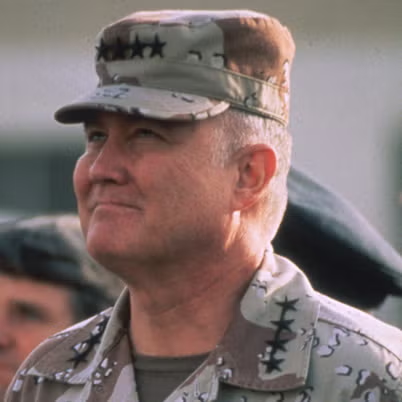
Table of Contents
Who Was Norman Schwarzkopf?
Nicknamed “Stormin’ Norman,” General Norman Schwarzkopf is renowned for his fiery temperament and exceptional strategic acumen. A graduate of West Point, Schwarzkopf served in the Vietnam War before rising to the rank of major general in 1983. He later became a four-star general and commander of the U.S. Central Command. His illustrious military career included commanding forces in Grenada and leading the coalition in the Persian Gulf War. Schwarzkopf passed away in Florida in December 2012.
Early Life
H. Norman Schwarzkopf was born on August 22, 1934, in Lawrenceville, New Jersey. He was raised alongside his two older sisters, Ruth Ann and Sally. His father, Colonel H. Norman Schwarzkopf, served in World War I and later founded the New Jersey State Police. Notably, he was involved in the high-profile 1932 kidnapping case of Charles Lindbergh’s son and served again in World War II. After the war, the family accompanied his father to Iran, where Schwarzkopf attended school before moving to Geneva, Switzerland. He then attended Valley Forge Military Academy and subsequently enrolled at the United States Military Academy at West Point. At West Point, he excelled in athletics, participating in both the football and wrestling teams, and was a member of the chapel choir. He graduated in 1956 with a degree in engineering and later obtained a master’s degree in the same field from the University of Southern California.
Military Career
Schwarzkopf volunteered for the Vietnam War in 1966, where he earned several accolades, including three Silver Stars, a Bronze Star, and a Purple Heart, while serving as a battalion commander. After suffering from a cracked vertebra, he underwent back surgery at Walter Reed National Military Medical Center in 1971 and attended the U.S. Army War College the following year. Following the end of the Vietnam War, Schwarzkopf continued to ascend the ranks, achieving the rank of general in the late 1970s. He served as the deputy commander during the U.S. invasion of Grenada in 1983, and in 1988, he was appointed to lead the U.S. Central Command, becoming a pivotal figure in the response to Iraq’s invasion of Kuwait in 1990.
In 1991, Schwarzkopf commanded Operation Desert Storm, the U.S. military operation aimed at liberating Kuwait, successfully driving out Saddam Hussein’s forces in just six weeks. His straightforward leadership style and strong demeanor earned him considerable acclaim, and he received numerous honors for his performance during the conflict, including a knighthood from Queen Elizabeth II.
Autobiography
After retiring from military service in 1991, Schwarzkopf chronicled his experiences in his autobiography, It Doesn’t Take a Hero, published the following year. The memoir became a bestseller, resonating with readers and further cementing his legacy.
Final Years
In his post-military life, Schwarzkopf served as a military analyst for NBC and became a sought-after public speaker, delivering lectures across the country. While there was speculation about a potential political career, he chose to focus on philanthropic endeavors, supporting various charities, including children’s organizations, and advocating for the conservation of grizzly bears and prostate cancer awareness.
Despite his retirement, Schwarzkopf remained engaged in military discourse. In 2003, he publicly expressed concerns regarding the invasion of Iraq under President George W. Bush, emphasizing the importance of considering the complexities of postwar Iraq. He questioned the potential challenges posed by sectarian divisions, stating, “What is postwar Iraq going to look like, with the Kurds and the Sunnis and the Shiites? That’s a huge question, to my mind. It really should be part of the overall campaign plan,” as reported by the Associated Press.
Death and Legacy
Schwarzkopf passed away on December 27, 2012, at his home in Tampa, Florida. Former President George H.W. Bush honored him as “a true American patriot and one of the great military leaders of his generation,” stating, “Schwarzkopf, to me, epitomized the ‘duty, service, country’ creed that has defended our freedom and seen this great nation through our most trying international crises. More than that, he was a good and decent man, and a dear friend.” He is survived by his wife, Brenda, and their three children.
